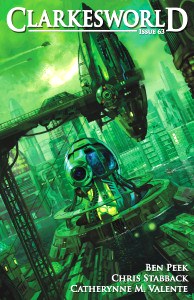 Clarkesworld #63, December 2011
Clarkesworld #63, December 2011
“Sirius” by Ben Peek
“In Which Faster-Than-Light Travel Solves All of Our Problems” by Chris Stabback
“Silently and Very Fast” by Catherynne M. Valente (Part 3, not reviewed)
Reviewed by Sherry Decker
“Sirius” by Ben Peek
Here is a tale about mistakes made by characters with good intentions. It’s about how ambition and jealousy and selfishness relate to viruses destined to destroy themselves by eliminating their hosts. It’s about forgiveness and the lack of forgiveness, and how prejudice, while wrong in its original concept, sometimes under extreme circumstances, turns out to be correct. This story is about suspicion and pride and how these flaws ultimately bring down civilizations.
While I appreciate the intelligence behind the story, the story itself lacked excitement. I realize it’s difficult to develop danger and consequence in short fiction. “Sirius” seemed more devoted to the emotions of the characters than their actions. Emotions are important but, in my humble opinion, story is more interesting. The strongest parts of “Sirius” are in dialogue, but the introspection and the narrative dominate.
The author depends on the common devices could see, could hear, could feel. What’s wrong with, I saw, I heard, I felt? The reader also must slow down for the occasional awkward use of an adverb, such as in adrift brokenly. Ever consider how adverbs are notoriously weak? Why do so many writers depend on these amateurish methods and refuse to consider other techniques? I cannot imagine what horrible disaster would have befallen us if the description of the space station had been adrift, broken. Sometimes stylistic cleverness is a mistake.
In “Sirius” we hear from seven different characters. They are unique and interesting in their telling of the story. They all have motives, ambition and a certain amount of compassion.
“Sirius” is based on a strong idea. Perhaps it should have been a novella, with more time spent on action and plot instead of mired in the interaction between characters. Other readers may have a different opinion.
Chris Stabback grabbed my attention with the opening line and held it throughout the entire story. “In Which Faster-Than-Light Travel Solves All of Our Problems” we never know the protagonist’s name, but we soon know what he thinks about, or more precisely, what he refuses to think about. We know he guards his thoughts and feelings even from himself. We know he avoids sharing information with anyone, or making eye contact or answering questions because it empowers the other person. He pees in a bottle. He leaves his spaceship every seven months or so for repairs and spends a few nights getting drunk, listening to aging space travelers’ rowdy tales, and spending the night with a prostitute. Nothing we wouldn’t expect from a lonely space traveler.
Until . . . he makes a pick-up on an asteroid, a place “no one would go.” Yet, on this barren asteroid he meets a man. The man’s spacesuit appears to offer very little protection from the elements and he’s running out of oxygen. Against his instincts our protagonist gives the man a lift.
I like Chris Stabback’s writing. He relies on a few overly-common techniques, such as could see, or could hear and towards (instead of toward) but his talent is revealed in the details, and there are plenty of entertaining details in this story. There is danger and aliens and blood and guts and a hairy escape.
The ending is not entirely unexpected. Even so, I enjoyed this story, and the writing.